First you should amend the Dao's so that they return the id of the inserted row enabling you to ascertain the actual id of the inserted rows. So :-
@Insert(onConflict = OnConflictStrategy.REPLACE)
public long insertCard(Card card);
@Insert(onConflict = OnConflictStrategy.REPLACE)
public long insertTag(Tag tag);
@Insert(onConflict = OnConflictStrategy.REPLACE)
public long insertCardWithTags(CardTagCrossRef cardTagCrossRef);
This allows you to retrieve the respective id when you insert either a Card or a Tag (note that for a CardTagCrossRef insertion this will be the rowid, a normally hidden row).
So you could then have use long cardId = cardDAO.insertCard(card.getCard()); and not then need to attempt to use cardTagCrossRef.idCard = card.getCard().getIdCard(); where the card DOES NOT have the id of the inserted card (part of the issue you are facing).
And likewise for the Tag.
So you could use :-
long cardId = cardDAO.insertCard(card.getCard());
for (Tag t: card.getTagList()) {
long tagId = cardDAO.insertTag(t);
CardTagCrossRef cardTagCrossRef = new CardTagCrossRef();
cardTagCrossRef.idCard = cardId;
cardTagCrossRef.idTag = tagId;
Log.d(TAG, "CardCrossRef:" + cardTagCrossRef.idCard + cardTagCrossRef.idTag);
cardDAO.insertCardWithTags(cardTagCrossRef);
}
However, with a few changes I believe that that can make things far more flexible and have an insert that effectively does what you want within the Dao's.
SO perhaps consider the following that culminates in a working DEMO
Card
@Entity
public class Card {
@PrimaryKey/*(autoGenerate = true) SUGGESTED suppression of autogenerate as will still autogenerate but more efficiently */
private Long idCard;
@ColumnInfo(name = "title")
private String title;
@ColumnInfo(name = "taboo_word_1")
private String tabooWord1;
@ColumnInfo(name = "taboo_word_2")
private String tabooWord2;
@ColumnInfo(name = "taboo_word_3")
private String tabooWord3;
@ColumnInfo(name = "taboo_word_4")
private String tabooWord4;
@ColumnInfo(name = "taboo_word_5")
private String tabooWord5;
/* Constructors added */
public Card(){}
@Ignore
public Card(Long idCard,String title, String tabooWord1, String tabooWord2, String tabooWord3, String tabooWord4, String tabooWord5) {
this.idCard = idCard;
this.title = title;
this.tabooWord1 = tabooWord1;
this.tabooWord2 = tabooWord2;
this.tabooWord3 = tabooWord3;
this.tabooWord4 = tabooWord4;
this.tabooWord5 = tabooWord5;
}
public Long getIdCard() {
return idCard;
}
public void setIdCard(Long idCard) {
this.idCard = idCard;
}
public String getTitle() {
return title;
}
public void setTitle(String title) {
this.title = title;
}
public String getTabooWord1() {
return tabooWord1;
}
public void setTabooWord1(String tabooWord1) {
this.tabooWord1 = tabooWord1;
}
public String getTabooWord2() {
return tabooWord2;
}
public void setTabooWord2(String tabooWord2) {
this.tabooWord2 = tabooWord2;
}
public String getTabooWord3() {
return tabooWord3;
}
public void setTabooWord3(String tabooWord3) {
this.tabooWord3 = tabooWord3;
}
public String getTabooWord4() {
return tabooWord4;
}
public void setTabooWord4(String tabooWord4) {
this.tabooWord4 = tabooWord4;
}
public String getTabooWord5() {
return tabooWord5;
}
public void setTabooWord5(String tabooWord5) {
this.tabooWord5 = tabooWord5;
}
}
- 2 changes an more flexible constructor and not using autogenerate = true (but that does automatically generate id's BUT without the overheads of the SQLite AUTOINCREMENT which is what autogenerate = true adds).
Tag (similar changes)
@Entity
public class Tag {
@PrimaryKey/*(autoGenerate = true) SUGGESTED suppression of autogenerate*/
private Long idTag;
@ColumnInfo(name = "tag")
private String tag;
public Tag(){}
@Ignore
public Tag(Long idTag, String tag) {
this.idTag = idTag;
this.tag = tag;
}
@Ignore
public Tag(String tag) {
this.tag = tag;
}
public Long getIdTag() {
return idTag;
}
public void setIdTag(Long idTag) {
this.idTag = idTag;
}
public String getTag() {
return tag;
}
public void setTag(String tag) {
this.tag = tag;
}
@Override
public String toString() {
return getTag();
}
}
CardTagCrossRef (added ForeignKey constraints to enforce/manage referential integrity)
@Entity(
primaryKeys = {"idCard", "idTag"}
/* SUGGESTED */
, foreignKeys = {
@ForeignKey(
entity = Card.class,
parentColumns = "idCard",
childColumns = "idCard",
/* SUGGESTED with ForeignKey */
onDelete = CASCADE,
onUpdate = CASCADE
),
@ForeignKey(
entity = Tag.class,
parentColumns = "idTag",
childColumns = "idTag",
/* SUGGESTED with ForeignKey */
onDelete = CASCADE,
onUpdate = CASCADE
)
}
)
public class CardTagCrossRef {
public long idCard;
@ColumnInfo(index = true) /* SUGGESTED */
public long idTag;
public CardTagCrossRef(){}
@Ignore
public CardTagCrossRef(long idCard, long idTag) {
this.idCard = idCard;
this.idTag = idTag;
}
}
CardWithTags
identical other than @Ignore annotation on the CardWithTags(Card card, List<Tag> tagList) constructor to supress warnings about multiple good consctructors.
i.e.
....
@Ignore /*<<<<< SUGGESTED */
public CardWithTags(Card card, List<Tag> tagList) {
this.card = card;
this.tagList = tagList;
}
....
CardDAO (new INSERT + return values)
@Dao
abstract class CardDAO {
/* public interface CardDAO { CHANGED TO abstract class to allow functions with bodies */
@Insert(onConflict = OnConflictStrategy.REPLACE)
abstract long insertCard(Card card); /* Returns long (inserted row id) */
@Insert(onConflict = OnConflictStrategy.REPLACE)
abstract long insertTag(Tag tag); /* Returns long (inserted row id) */
@Insert(onConflict = OnConflictStrategy.REPLACE)
abstract long insertCardWithTags(CardTagCrossRef cardTagCrossRef); /* Returns long (inserted row id) */
/* NEW INSERT */
@Query("")
@Transaction
long[] insert(Card card, List<Tag> tags) {
long[] rv = new long[tags.size() + 1];
int ix = 0;
rv[ix++] = insertCard(card);
if (rv[ix-1] > -1) {
for (Tag t : tags) {
rv[ix++] = insertTag(t);
if (rv[ix-1] > -1) {
insertCardWithTags(new CardTagCrossRef(rv[0],rv[ix-1]));
}
}
}
return rv;
}
// If called on an item not present in the DB it won't do anything
@Update
abstract int updateCard(Card card); /* returns number of updated rows */
@Delete
abstract int deleteCard(Card card); /* returns number of deleted rows */
// With a query method you can also perform complex inserts/updates/deletes
// Transaction needed for relational classes
@Transaction
@Query("SELECT * FROM Card")
/* abstract LiveData<List<CardWithTags>> getAllCards(); COMMENTED OUT to allow demo to run on main thread */
abstract List<CardWithTags> getAllCards(); /* same but not with LiveData */
}
DatabaseTaboom (allow main thread + exportSchema = false to suppress warning)
@Database(entities = {Card.class, Tag.class, CardTagCrossRef.class},
version = 1/* SUGGESTED */ , exportSchema = false)
public abstract class DatabaseTaboom extends RoomDatabase {
public static final String DATABASE_NAME = "db_taboom-1";
abstract CardDAO cardDao();
public static DatabaseTaboom db;
// Singleton pattern
public static DatabaseTaboom getDatabase(Context applicationContext) {
if (db == null) {
db = Room.databaseBuilder(applicationContext, DatabaseTaboom.class, DATABASE_NAME)
.allowMainThreadQueries() /* uncommented for testing */
.build();
}
return db;
}
}
Finally the DEMO MainActivity with some examples of inserting Cards, Tags and CardTagCrossRef's followed by extracting them all outputting the results to the log.
public class MainActivity extends AppCompatActivity {
DatabaseTaboom db;
CardDAO dao;
@Override
protected void onCreate(Bundle savedInstanceState) {
super.onCreate(savedInstanceState);
setContentView(R.layout.activity_main);
db = DatabaseTaboom.getDatabase(this);
dao = db.cardDao();
/* Simple but long winded */
long c1id = dao.insertCard(new Card(null,"Card1","tw1","tw2","tw3","tw4","tw5"));
long t1id = dao.insertTag(new Tag(null,"TAG1"));
CardTagCrossRef ctcr1 = new CardTagCrossRef();
ctcr1.idCard = c1id;
ctcr1.idTag = t1id ;
dao.insertCardWithTags(ctcr1);
/* Using additional constructor for CardTagCrossRef */
long t2id = dao.insertTag(new Tag("TAG2"));
dao.insertCardWithTags(new CardTagCrossRef(c1id,t2id));
/* More dynamic BUT don't know the actual inserted id's of the Card and Tag */
dao.insertCardWithTags(
new CardTagCrossRef(dao.insertCard(new Card(100l,"Card2","c2tw1","c2tw2","c2tw3","c2tw4","c2tw5")),dao.insertTag(new Tag(null,"TAG3"))));
CardWithTags cwt = new CardWithTags(
new Card(null,"CARD3","c3tw1","c3tw2","c3tw3","c3tw4","c3tw5"),
Arrays.asList(
new Tag(null,"TAG4"), new Tag("TAG5"), new Tag("TAG6")
)
);
/* Amended insert function */
insertCard(cwt,dao);
/* Using new insert funciotn */
dao.insert(
new Card(1000l,"CARD4","c4tw1","c4tw2","c4tw3","c4tw4","c4tw5"),
Arrays.asList(
new Tag(null,"TAG7"), new Tag(500l,"TAG8"),new Tag(null,"TAG9")
)
);
/* Extract the results and output to the log */
for(CardWithTags cwtlist: dao.getAllCards()) {
Log.d("CWTINFO","Card is " + cwtlist.getCard().getTitle() + " TabooWord1 is " + cwtlist.getCard().getTabooWord1() + " it has " + cwtlist.getTagList().size() + " tags. They are:-");
for(Tag t: cwtlist.getTagList()) {
Log.d("CWTINFO_TAG","\tTAG is " + t.getTag());
}
}
}
public void insertCard(CardWithTags card, CardDAO cardDAO) {
final String TAG = "INSERTCARDINFO";
Log.d(TAG, ">>insertCard(): " + card);
/*
executor.execute(() -> {
*/
long currentCardId = cardDAO.insertCard(card.getCard());
for (Tag t: card.getTagList()) {
long currentTagId = cardDAO.insertTag(t);
CardTagCrossRef cardTagCrossRef = new CardTagCrossRef();
cardDAO.insertCardWithTags(new CardTagCrossRef(currentCardId,currentTagId));
/*
cardTagCrossRef.idCard = card.getCard().getIdCard();
cardTagCrossRef.idTag = t.getIdTag();
*/
/*
OR with new Contsructor
CardTagCrossRef ctcr = new CardTagCrossRef(currentCardId,currentTagId);
*/
/* AND THEN cardDAO.insertCardWithTags(cardTagCrossRef); */
Log.d(TAG, "CardCrossRef:" + cardTagCrossRef.idCard + cardTagCrossRef.idTag);
}
/*
// Check if tags already exists
cardListIsUpdatedWithDb = false;
*/
/*})*/;
}
}
When run (after new install as only designed to run the once) the Log includes:-
2022-02-04 13:29:10.569D/INSERTCARDINFO: >>insertCard(): a.a.so70979022javaroom.Card@d751e5e, TAG[TAG4TAG5TAG6]
2022-02-04 13:29:10.573D/INSERTCARDINFO: CardCrossRef:00
2022-02-04 13:29:10.578I/chatty: uid=10194(a.a.so70979022javaroom) identical 1 line
2022-02-04 13:29:10.581D/INSERTCARDINFO: CardCrossRef:00
2022-02-04 13:29:10.600D/CWTINFO: Card is Card1 TabooWord1 is tw1 it has 2 tags. They are:-
2022-02-04 13:29:10.600D/CWTINFO_TAG: TAG is TAG1
2022-02-04 13:29:10.601D/CWTINFO_TAG: TAG is TAG2
2022-02-04 13:29:10.601D/CWTINFO: Card is Card2 TabooWord1 is c2tw1 it has 1 tags. They are:-
2022-02-04 13:29:10.601D/CWTINFO_TAG: TAG is TAG3
2022-02-04 13:29:10.601D/CWTINFO: Card is CARD3 TabooWord1 is c3tw1 it has 3 tags. They are:-
2022-02-04 13:29:10.601D/CWTINFO_TAG: TAG is TAG4
2022-02-04 13:29:10.601D/CWTINFO_TAG: TAG is TAG5
2022-02-04 13:29:10.601D/CWTINFO_TAG: TAG is TAG6
2022-02-04 13:29:10.601D/CWTINFO: Card is CARD4 TabooWord1 is c4tw1 it has 3 tags. They are:-
2022-02-04 13:29:10.601D/CWTINFO_TAG: TAG is TAG7
2022-02-04 13:29:10.601D/CWTINFO_TAG: TAG is TAG8
2022-02-04 13:29:10.601D/CWTINFO_TAG: TAG is TAG9
Via App Inspection then :-

and :-

and :-



